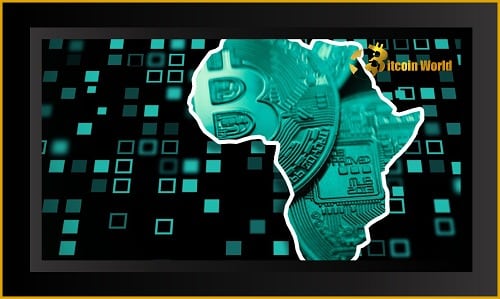Is Africa on the verge of a major crypto breakthrough? It certainly seems so! The latest buzz in the crypto sphere is coming straight from the heart of Africa, where the Democratic Republic of Congo (DRC) is seriously exploring the launch of a national stablecoin powered by blockchain technology. And that’s not all – DRC, alongside Cameroon and the Republic of Congo, is also considering adopting a suite of cryptocurrency and blockchain-based solutions, all thanks to The Open Network (TON). Let’s dive into what this could mean for Africa and the global crypto landscape.
Africa Embraces Blockchain: A New Dawn?
According to TON, these ambitious plans are the result of fruitful discussions with each of the three nations. The rollout of TON’s crypto and blockchain solutions across these countries will be a phased process, as detailed in their official release. This move signals a significant step towards embracing digital currencies and blockchain innovation in Central Africa.
Why Democratize Finance? Africa’s Perspective
The driving force behind this potential adoption is the desire to democratize financial systems and foster greater financial inclusion. Léon Juste Ibombo, the Minister for Posts, Telecommunications, and the Digital Economy of the Republic of Congo, eloquently explains his country’s vision:
“The Republic of the Congo has been on this path for a number of years, having encouraged and witnessed the widespread adoption of mobile payments across the country. This is the next step in that journey, and we believe that TON is the right partner to facilitate this. This will be an invaluable, practical instrument for the growth and creation of wealth, both for the government and our people alike.”
His counterpart from the DRC, Désiré Cashmir Eberande Kolongele, Minister for Digital Economy, echoed these sentiments, highlighting the transformative potential for financial access. He believes the stablecoin launch will be a game-changer, bringing “millions of unbanked and underbanked persons access to our financial system.”
Minette Libom Li Likeng, Cameroon’s Minister of Posts and Telecommunication, also emphasized the role of TON in enhancing financial inclusion and payment solutions within Cameroon, particularly through CAMPOST, the nation’s public postal operator.
Key Benefits of Blockchain and Crypto Adoption in Africa:
- Financial Inclusion: Reaching the unbanked and underbanked populations, providing access to essential financial services.
- Economic Empowerment: Fostering economic growth and wealth creation through innovative financial tools.
- Efficient Payment Systems: Streamlining transactions and reducing costs associated with traditional financial systems.
- Transparency and Security: Leveraging blockchain’s inherent security and transparency to build trust in financial systems.
- Digital Economy Growth: Positioning these nations at the forefront of the burgeoning digital economy.
What is TON and Why Africa?
TON, or The Open Network, is a fast, scalable, and user-friendly blockchain platform originally designed by the Telegram team. It boasts features that are particularly appealing for large-scale adoption, including:
- High Transaction Speed: Capable of processing millions of transactions per second, essential for national-level financial systems.
- Low Transaction Fees: Making financial services more accessible and affordable for everyone.
- User-Friendly Interface: Simplifying crypto interactions for mass adoption, even for those new to digital currencies.
- Robust Ecosystem: A growing ecosystem of applications and services built on the TON blockchain.
Africa presents a unique landscape for crypto adoption. With a large percentage of its population unbanked and a significant mobile-first culture, the continent is ripe for innovative financial solutions that bypass traditional banking infrastructure. Blockchain and cryptocurrencies like TON offer a compelling alternative.
Challenges and Considerations
While the potential benefits are immense, the journey towards national crypto adoption is not without its challenges:
- Regulatory Frameworks: Developing clear and supportive regulatory frameworks for cryptocurrencies and blockchain technology is crucial. Governments need to strike a balance between fostering innovation and mitigating risks.
- Infrastructure Development: Ensuring adequate digital infrastructure, including internet access and mobile penetration, across all regions is essential for widespread adoption.
- Education and Awareness: Educating the population about cryptocurrencies and blockchain technology is vital to build trust and encourage adoption. Addressing concerns about volatility and security is key.
- Security Risks: Mitigating potential security risks associated with digital currencies, such as scams and hacks, requires robust security measures and user education.
- Integration with Existing Systems: Seamlessly integrating new crypto systems with existing financial and governmental infrastructures can be complex and requires careful planning.
Africa Leading the Way in Crypto Innovation?
The move by DRC, Cameroon, and the Republic of Congo could be a watershed moment for crypto adoption in Africa and globally. If successful, these initiatives could serve as a blueprint for other nations looking to leverage blockchain technology for financial inclusion and economic development. It will be fascinating to watch how these plans unfold and the impact they have on the African crypto market and beyond.
Africa’s embrace of blockchain and cryptocurrency is not just about adopting new technology; it’s about taking control of its financial future and empowering its people. As these nations forge ahead, they are not just participating in the crypto revolution – they might just be leading it.
Related Posts : VALR raises $50 million in the largest crypto fundraising in Africa to date
Disclaimer: The information provided is not trading advice, Bitcoinworld.co.in holds no liability for any investments made based on the information provided on this page. We strongly recommend independent research and/or consultation with a qualified professional before making any investment decisions.


